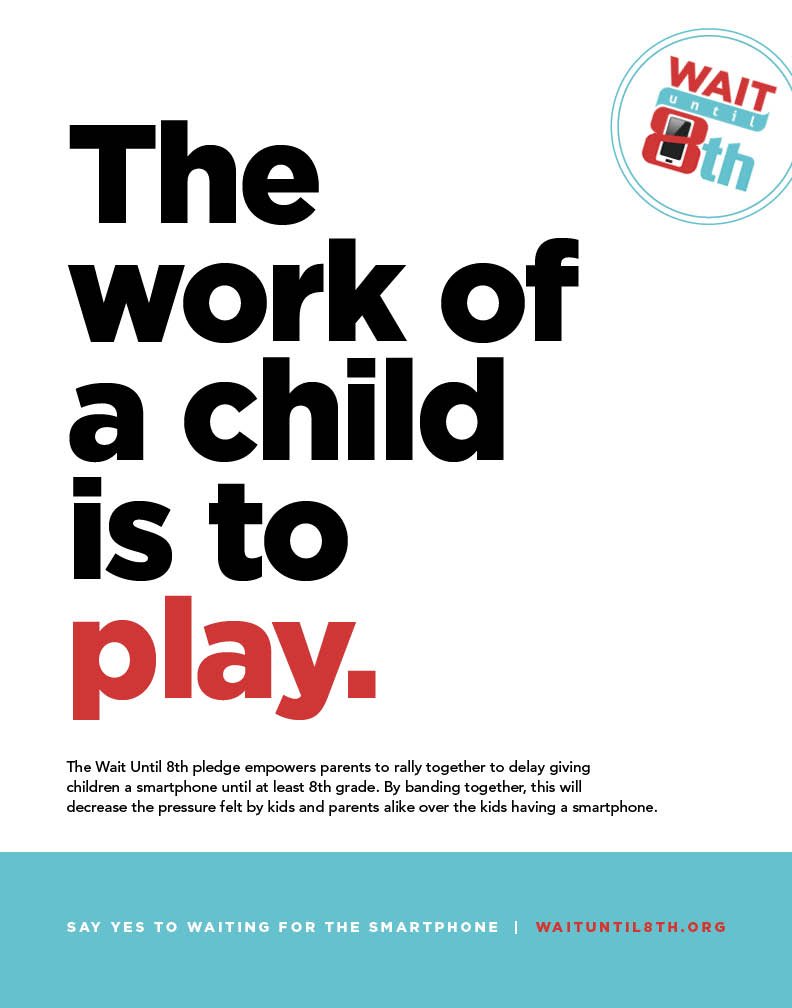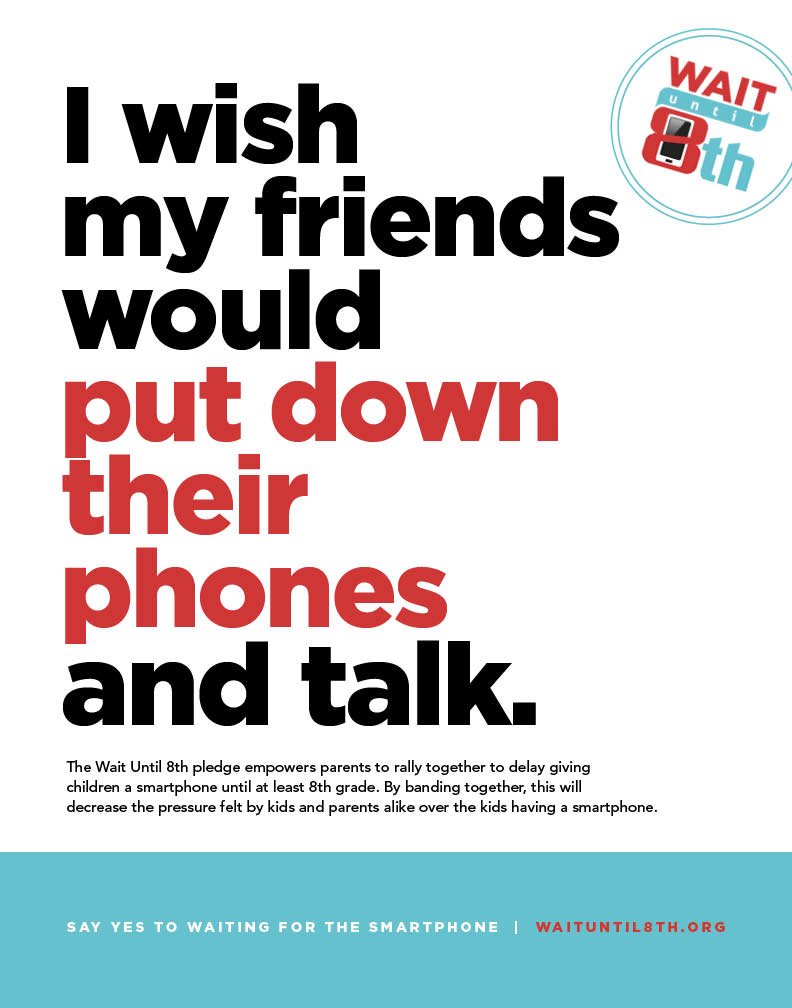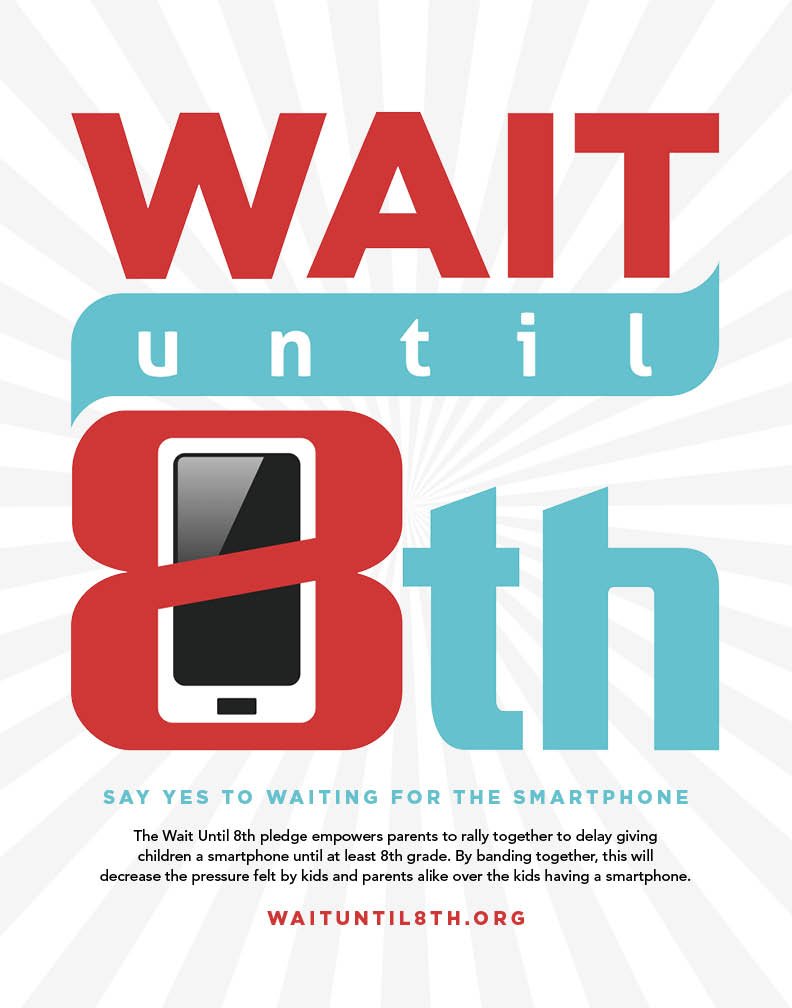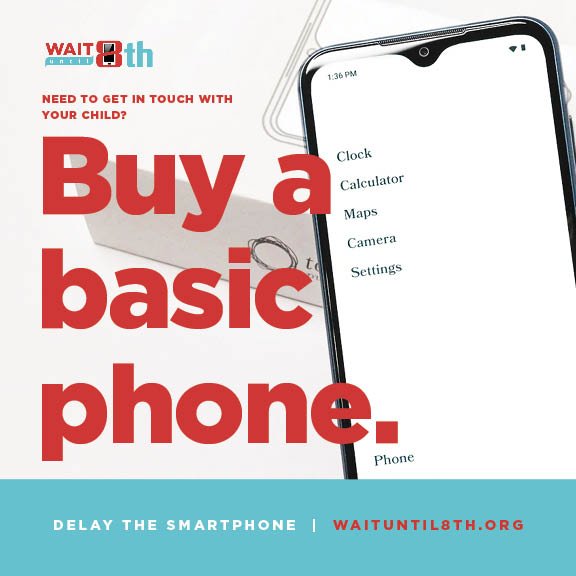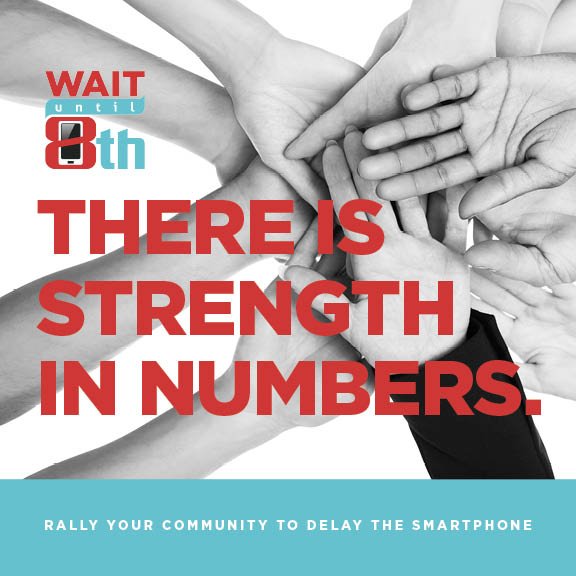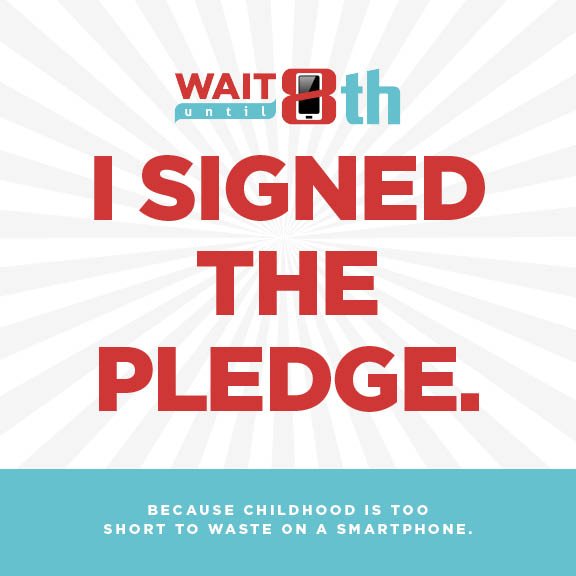Champion the pledge
You are fired up! You just signed the pledge and you are ready to champion Wait Until 8th in your community. Your voice is so important in fueling momentum for the pledge at your school and beyond. We want to support you in your local outreach. First, download our Champion Starter Guide to get a step-by-step tip sheet to start your local Wait Until 8th movement. The Champion Starter Guide will outline how to use the other downloadable resources featured below. Another key material to grab while you are here is the Email Template. Use this example to quickly get the word out to your friends and family about the pledge. More details about why parents should wait on delaying the smartphone and some frequently asked questions are featured in the Parent Info Packet. We also have a Campaign Sign, and Parent Flyer in English and Spanish to help spread the word. Be sure to come back to our resource page for new ideas and resources. We want this to be a robust support center to help you rally your community!
Posters
Spread the word about the Wait Until 8th pledge with one of our posters. Click on any poster below, download and print to display in your school, church or office. Healthcare professionals also like to use these posters to educate their patients about the importance of delaying the smartphone!
gather your community
Parents across the country are coming together to discuss parenting in a digital age, and how best to put healthy boundaries in place. Moms and dads are organizing coffees, lunches, PTO meetings and community events to share the Wait Until 8th pledge. Consider hosting a gathering for parents. It can be a simple coffee with several interested parents or a larger event such as presenting at a PTO meeting or spearheading a community forum. Stay tuned for a short informational video from Wait Until 8th. We hope to have one ready by the end of 2024 so you can present it at gatherings and events. In the meantime, some parents are showing this in-depth Wait Until 8th interview. Others are viewing the Social Dilemma or Childhood 2.0 together followed by a parent discussion on the smartphone and social media problem. However big or small your event is, often times inviting friends to come to the table to learn about the pledge ushers in more champions for the cause.
Wait Until 8th does a very limited number of speaking engagements for a speaking fee. Please contact us if you would like more details.
share with your social circles
A quick way to spread the word about the Wait Until 8th pledge is through social media posts. Share the good news today about the Wait Until 8th pledge with your family and friends by easily downloading one of our social media photos. Be sure to tag Wait Until 8th too in your post!
expand your knowledge on the issue
One of the best ways to advocate for your children is to learn how to navigate the digital world of parenting. These books and articles are excellent reads overflowing with important information and parenting tips. Gather some friends to read and discuss one of them and see where the conversation leads!
Be the Parent, Please is a must-read for any parent fumbling around in this digital world of parenting.
Toddlers on tablets. Pre-teens on Tumblr. Thanks to a variety of factors—from tech companies hungry for new audiences, to school administrations bent on making education digital, to a culture that promotes everyone as the star of their own reality shows—technology is irrevocably a part of childhood, and parents are struggling to keep up. What should be allowed? What should be denied? And, given the ubiquity of technology and its inherent usefulness, what do sensible boundaries even look like?
A noted columnist and mother of three, Naomi Schaefer Riley fully understands the seductive nature of screens. Riley gives parents a wakeup call to put healthy boundaries in place when it comes to technology and kids.
Wired Child is a practical guide to building your child’s bond with family and fostering school success amid the allure of digital screens. Kids’ obsessive use of video games, social media, and texting is eclipsing their connections with family and school—the two most important contributors to their well-being. The result: a generation of kids who suffer from soaring rates of emotional and academic problems, with many falling prey to an epidemic of video game and internet addictions.
Wired Child gives you the confidence and skills you need to safely navigate your children through a rapidly shifting media landscape. Dr. Freed offers concrete parenting strategies that will help you create the strong family kids need and encourage their school success. You’ll also learn how to protect kids from destructive tech addictions, and instead guide them to use technology productively as a positive force for their future.
In iGen: Why Today’s Super-Connected Kids Are Growing Up Less Rebellious, More Tolerant, Less Happy--and Completely Unprepared for Adulthood--and What That Means for the Rest of Us, Dr. Jean Twenge offers am alarming portrait of a new generation. Born in the mid-1990s to the mid-2000s and later, iGen is the first generation to spend their entire adolescence in the age of the smartphone. These kids had an instagram account before high school and do not remember a time before the internet. With social media and texting replacing other activities, iGen spends less time with their friends in person—perhaps why they are experiencing unprecedented levels of anxiety, depression, and loneliness. With generational divides wider than ever, parents, educators, and employers have an urgent need to understand today’s rising generation of teens and young adults.
In The Atlantic article, Have Smartphones Destroyed a Generation, Dr. Jean Twenge points to a growing body of evidence suggesting that extensive smartphone use among teens is driving today’s youngest generation to “the brink of a mental health crisis.” She warns that “the twin rise of the smartphone and social media has caused an earthquake of a magnitude we’ve not seen in a very long time, if ever. There is compelling evidence that the devices we’ve placed in young people’s hands are having profound effects on their lives—and making them seriously unhappy.” Every parent should read this article to have a better understanding of the detriemental impact smartphones are having on children.
In the Big Disconnect, clinical psychologist Catherine Steiner-Adair takes an in-depth look at how the Internet and the digital revolution are profoundly changing childhood and family dynamics, and offers solutions parents can use to successfully shepherd their children through the technological wilderness. Families are in crisis as they face this issue, and even more so than they realize. Not only do chronic tech distractions have deep and lasting effects but children also desperately need parents to provide what tech cannot: close, significant interactions with the adults in their lives. Drawing on real-life stories from her clinical work with children and parents and her consulting work with educators and experts across the country, Steiner-Adair offers insights and advice that can help parents achieve greater understanding, authority, and confidence as they engage with the tech revolution unfolding in their living rooms.
We’ve all seen them: kids hypnotically staring at glowing screens in restaurants, in playgrounds and in friends' houses—and the numbers are growing. Like a virtual scourge, the illuminated glowing faces—the Glow Kids—are multiplying. But at what cost? In Glow Kids, Dr. Nicholas Kardaras examines how technology has profoundly affected the brains of an entire generation. Brain imaging research is showing that stimulating glowing screens are as dopaminergic (dopamine activating) to the brain’s pleasure center as sex. And a growing mountain of clinical research correlates screen tech with disorders like ADHD, addiction, anxiety, depression, increased aggression, and even psychosis. Kardaras dives into the sociological, psychological, cultural, and economic factors involved in the global tech epidemic with one major goal: to explore the effect all of our shiny new technology is having on kids.













